Park+ Sees Business Opportunities In Metros And Tier-2 Cities
- By Sharad Matade
- December 19, 2020

India’s passenger-vehicle market has witnessed astonishing growth in the past decade. Barring the current hiccups, on account of ongoing urbanisation, increasing expenditure from the middle-class and young generation, and the country’s economic growth and supportive regulations and policies, India is expected to emerge as the world’s third-largest passenger vehicle market in future. However, the growth story will bring severe challenges for the parking space segment, especially in metro cities for which parking space has been a perennial issue.
As per a survey, a person spends an average of 17 hours a year for searching parking slots in New York, and the situation is grimmer in India where on average a person spends around 80 hours per year on finding parking. However, the situation varies in different cities.
Amit Lakhotia, Founder and CEO, Parviom Technologies, which owns Park+, faced car parking-related issues like any other Indians residing in metro cities. “Every day, we face challenges in finding an available parking slot, be it in office parking, malls, hotels or any other busy places. This leads to frustration and loss of time and fuel as well,” says Lakhotia. Due to difficulty in finding spaces for parking, people park their vehicles in the non-parking area or on the roads that occupies half of the road and which again causes traffic congestion, accidents, environmental hazards and even criminal activities.
“Parking related day-to-day issues were on my mind for some time while I was working with Paytm,” recalls Lakhotia. Having faced such parking-related issues, Amit Lakhotia found a business opportunity and launched the App, Park+, in 2019, which provides a suite of solutions around parking and more. With the help of Park+ app, users can discover parking, book their slot as well as other services such as car wash and pay digitally. They also provide RFID based security solutions to apartments and corporate setups.
 Early this year, Park+ has raised $11 million in a financing round co-led by venture capital funds Sequoia India and Matrix Partners India. Prominent angel investors, including Deep Kalra, Rajesh Magow, Ashish Hemrajani, Kunal Shah, Kunal Bahl and Rohit Bansal also participated in the round. Park+ is also the first company to collaborate with Aarogya Setu app for crowd management in malls.
Early this year, Park+ has raised $11 million in a financing round co-led by venture capital funds Sequoia India and Matrix Partners India. Prominent angel investors, including Deep Kalra, Rajesh Magow, Ashish Hemrajani, Kunal Shah, Kunal Bahl and Rohit Bansal also participated in the round. Park+ is also the first company to collaborate with Aarogya Setu app for crowd management in malls.
The Park+ business model starts with identifying hot spots and taking suppliers- parking operators -onboard in these areas. For a selected site, the company takes the responsibility to build and maintain the infrastructure needed for the business. Infrastructure includes different servers and hardware. Light hardware is used to monitor entry and exit, while complicated hardware is used for barriers, parking sensors and RFID based security solutions. “Deployment of infrastructure is based on the needs, but charges vary accordingly,” adds Lakhotia.
Park+ earns a commission from the parking operators of the parking space and a service charge from that availing of the service.
Lakhotia is confident that his app-based business will boom on the surging numbers of smartphone users and operators. Explaining further, he says, “Till 2015-16, the internet had not reached to the last mile space in any sector. Online search, ordering, payments, tracking and delivery were not as smooth as of today. However, Ola, Uber, Swiggy and other e-commerce portals brought a revolution in the online payment system and have made it very convenient for users and last-mile operators. Online businesses are also taking good efforts on their last mile employees for reading maps and handling deliveries. Till last a few years, parking operators did not have smartphones with internet connectivity, but now they have. Users and operators were ready, so we felt this is the right time to launch the business.”
India had the world’s second-largest internet population of around 483 million users in 2018, and, of these, 390 million users accessed the internet via their mobile phones. As per a report, India will have over 760 million smartphone users in 2021.
Mobile-phone based parking apps have already been running in the developed markets such as the USA and Europe, but challenges for Park+ will be unique and tough considering the rapidly concentrating population, unplanned structures, and scarcity and skyrocketing prices of lands in cities. Expansion of cities in the western world have been well planned, and vehicle parking has been an integral part of the design of the new cities and the development of old cities. With the growing urbanisation, India is likely to have over 500 million people living in cities by 2030.
Considering the challenges for finding and booking parking space in India, the sweet spot for the Park+ is to help users to find and book parking spaces more conveniently and parking operators to utilise parking spaces more optimally.
“Since there is a minimal scope to build new infrastructure to make parking sites, we focus on to make these parking spaces available more efficiently. For instance, on weekdays, parking space is fully occupied in corporate parks, but malls, hotels and shopping complexes are less crowded, so are their parking sites. This scenario is vice versa on weekends. If a corporate park is near to a mall, the former can use the parking site of the latter on weekdays; the same can be done vice versa on weekends. That is how parking space can be used effectively, and operators’ revenue can go up,” explains Lakhotia.
Though as now of Park+ is offering its services in major cities, it sees opportunities in Tier -2 as well. Residents in metro cities are still reluctant to buy a car owing parking and traffic issues and opt for the shared mobility but growing middle-class incomes pushing car sales in Tier-2 cities. “What parking-related issues we are facing in the Tier-1 cities, eventually we will face the same in Tier-2 in future. So, we also see big business opportunities in Tier-2 cities in the country,” predicts Lakhotia.
Park+ will also explore possibilities to tie up with city corporations which operate parking sites in the cities. “We are looking for such tie-ups. It is just a matter of time when we can have to tie up with municipal corporations.”
Apart from the core service, Park+ is also offering services for insurance, pollution control certificate, RTO service, and information on traffic rules and fuel prices. The company now plans to widen its service offering with vehicle services, maintenance, washing and others. “Some of these services will be provided by third parties, while some services we will provide to the customer directly,” adds Lakhotia.
The company will also explore the option to have tie-ups with OEs to provide the Park+ inbuilt services in their vehicles. “We will try to make available our services to OEs as the business scales up.”
Lakhotia has spent more than ten years building significant size internet businesses. He is ex-Paytm, Tokopedia and Makemytrip and played a critical role in scaling them to multi-billion dollar companies. His experience with the internet business is helping him to build his own business. “Paytm is a digital platform which is being used by masses in India. It is being used by auto drivers, tea sellers, literally by everyone. The distribution of Paytm is available everywhere for both users and merchants in both urban and rural areas. When we started the business, we never thought we would go that big. It does not matter how great your product is; it should work on all devices and networks. The product should win the trust of users since you are handling their money. Transparency is must in internet businesses,” says Lakhotia.
Today, the company has around two lakh subscribers, and Lakhotia expects the subscriber number will reach two million by 2021. The company adds 40,000 cars to the network every month, and 300,000 cars have their RFID tags. So far, the company has set up 800 sites in India. “Currently, we have around 18,000 real-time slots available, and overall, we have 60,000 slots.”
Talking on challenges, Lakhotia says Park+ is a pioneer in the business, and the challenges are new and unpredictable. “Since it is a real-time business, the challenge is how to deliver the services in the expected time. Also, this is a low-ticket business; we will have to make sure it will work smoothly.” (MT)
- IAC India
- Lumax Group
- IAC Group
- Mahindra
- VECV
- Maruti Suzuki India
- Skoda
- Volkswagen
- Stellantis
- Sunil Koparkar
IAC India Bets On Engineering Depth & Diversification, Targets 20% CAGR Growth Till FY2030
- By Nilesh Wadhwa
- February 28, 2026

Sunil Koparkar, Managing Director, IAC India, outlines the company’s strategy to reduce customer concentration, expand exports and leverage group synergies following its integration with the Lumax Group.
As India’s automotive interior market evolves towards premiumisation, localisation and faster product cycles, IAC India, part of the Lumax Group, is repositioning itself beyond a single-customer dependency model – without diluting its core partnerships.
IAC India continues to derive a significant share of its revenue from Mahindra’s passenger vehicle business. While the concentration remains high, Koparkar is clear that diversification will be driven through growth rather than dilution.
“Mahindra will always be our primary customer. We have a very strong strategic partnership. But we are also working on expanding with other OEMs and in the commercial vehicle space. Our goal remains a 20 percent CAGR,” he says.
For FY2025, IAC India USD 140 million in revenue, and is targeting a 20 percent growth in FY2026. The company counts Mahindra as its primary customer with almost 78 percent of its business coming from them, while Maruti Suzuki India (12%), Volvo Eicher Commercial Vehicles (5%), Skoda-Volkswagen (3%) and Stellantis (1%) contribute towards the remaining business.
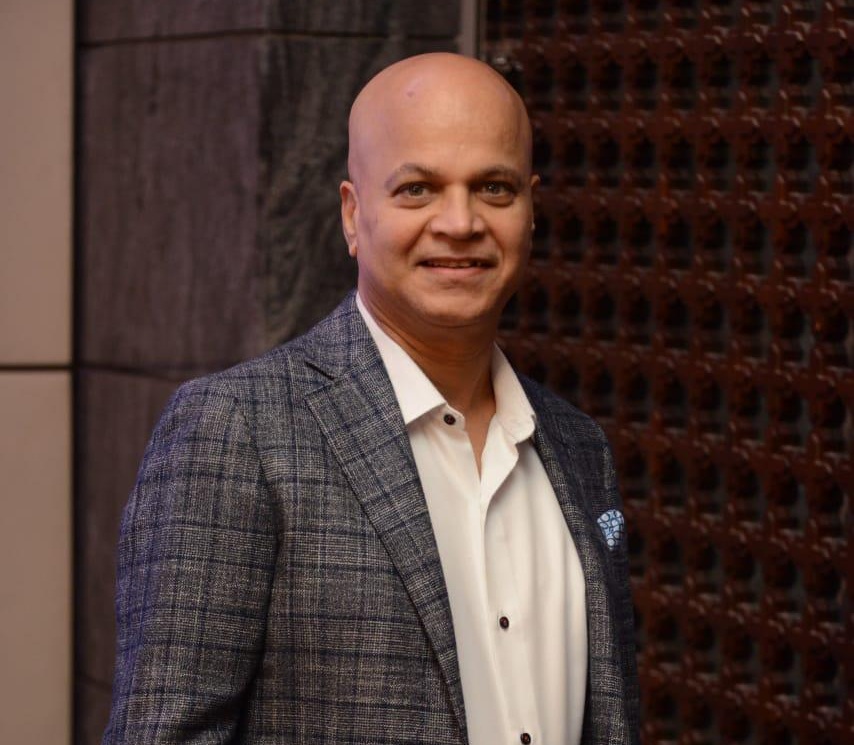 What’s more, responding to the company’s expansion plans, Koparkar revealed, that IAC Group, in addition to introducing new products, is also in talks with new-age players who have just entered Indian market (and also planning too) for supplying products.
What’s more, responding to the company’s expansion plans, Koparkar revealed, that IAC Group, in addition to introducing new products, is also in talks with new-age players who have just entered Indian market (and also planning too) for supplying products.
Currently, passenger vehicles account for roughly 90 percent of the business, with commercial vehicles forming the balance. Value-wise, Koparkar expects CV contribution to rise, even if percentage splits remain broadly similar due to the rapid growth of PV volumes.
Responding to a query on the potential growth from the CV segment, Koparkar said, “There is clear potential in CV interiors. As the CV market moves towards more comfortable cabins — with features like airbags, HVAC and infotainment — the opportunity for interior suppliers increases. Through Volvo Eicher, we have already helped drive that trend in India.”
When asked about the company’s expansion plans, Koparkar also stated that IAC Group is open to expanding to new regions as it aims to operate closer to its customers. One of the potential new projects for the company could very well be Chennai, as the company is in early talks with a new CV customer as well as VinFast.
Engineering as a Standalone Growth Lever
A key pillar of IAC India’s strategy is its expanding engineering capability. The company has been scaling up its R&D and product development team and increasingly positioning engineering services as a distinct revenue stream.
The company at present, employs over 300 engineers in India, which it aims to scale it upto 400-plus by next year and 500-plus in the coming few years.
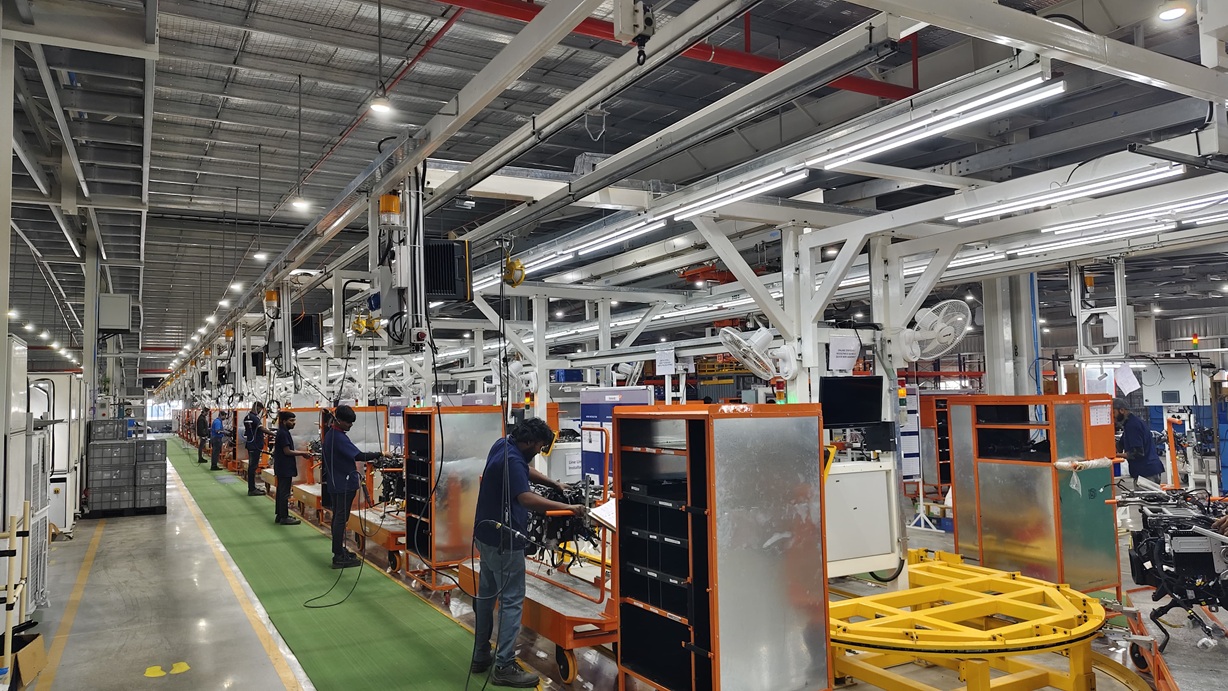
Historically, the Indian Engineering Centre supported the global IAC Group. “We were primarily the IAC Group engineering development centre. We will continue to provide those services. But now, besides global support, we are also offering engineering services to local OEMs,” Koparkar explains.
These services span studio collaboration, basic product design, CAE analysis and prototype development. In some cases, this can potentially evolve into full-scale supply programmes.
Importantly, innovation is now being formalised locally. “This year alone, we are in the process of filing about 30 patents,” he says. Earlier, intellectual property was subsumed under the global entity; now, filings are being initiated in India.
R&D investment remains aligned with group benchmarks at around 1.5–2 percent of revenue.
Exports: Measured Ambition
In terms of export potential, it currently contributes less than 5 percent towards the revenue, primarily through smaller kinematic parts. Direct exposure to the US market is negligible.
“Tariff-related uncertainty does not affect us because we do not export to the US,” Koparkar says. “Logistically, it does not make sense to ship our large interior parts there.”
Europe remains the primary export target. “The opportunity lies in leveraging our design capabilities and local development strengths. If logistics can be managed efficiently, there is room to grow.”
He also sees the Lumax Group’s aftermarket division as a future vehicle for export expansion.
Localisation and Supply Chain Resilience
On the localisation front, IAC India has made significant progress. “Last year was the first time we were able to localise over 99 percent of our tooling and development in India,” Koparkar states. Machinery on shop floors is largely localised, with only certain raw materials still imported.
The semiconductor crisis, he adds, had minimal direct impact. “We do not source electronics for our products — that is handled by the customer. However, from a development perspective, we are evaluating secondary substitutes for imported components, so we are prepared in case of disruptions.”
Premiumisation, Sustainability and AI
Premiumisation is currently the dominant interior trend. “Customers are moving away from basic plastics to more premium-feel interiors. Electronification is a big driver,” Koparkar says.
Sustainability, however, remains nascent in India. “There is no specific push for sustainable materials yet. What OEMs are looking for is lightweighting to meet upcoming CAFE norms. If a sustainable material delivers significant weight reduction, then it becomes serious.”
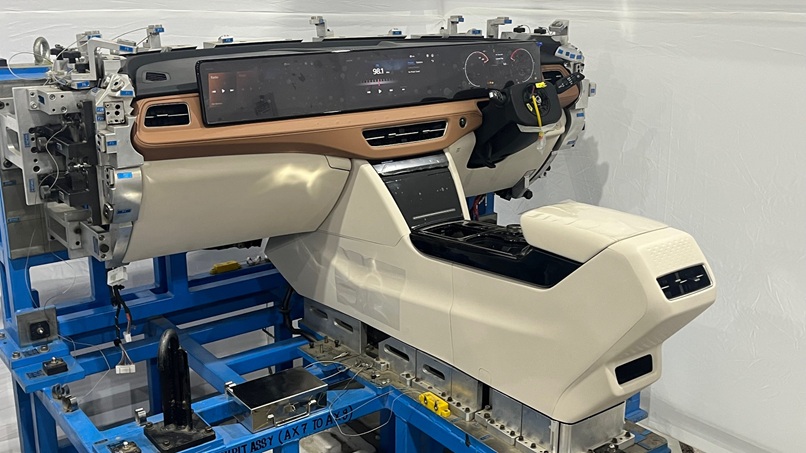
He points to jute, coir and bamboo fibres as potential alternatives but stresses that ecosystem-level collaboration is essential. “Unless a circular economy develops around us, sustainable materials will struggle to scale.”
On automation, operations across IAC’s six plants are roughly a 50:50 mix of automated and manual processes, depending on volume justification. Cobots and semi-automation are used where full automation does not offer viable returns.
AI, meanwhile, is expected to influence design more than manufacturing. “We see AI helping us accumulate design learnings and reduce design cycle times. Its impact will be more visible in engineering services than on the shop floor.”
Faster Development Cycles
Product life cycles are shrinking rapidly. “It used to take five years to develop a car,” Koparkar reflects. “With the XUV700, we worked with the customer to shrink that to 42 months. EVs are being developed even faster.”
As development timelines compress and interiors become more technology-intensive, IAC India is betting on engineering depth, localisation strength and group synergies to sustain its 20 percent growth ambition – while steadily broadening its customer and geographic footprint
- Rosmerta Technologies
- The Curious Bunch
- CII National Conclave on Road Safety
- Dr Rajesh Mohan
- Ravi Krishnamoorthi
- road safety
Rosmerta Launches Road Safety Comic Book For Schools
- By MT Bureau
- February 27, 2026
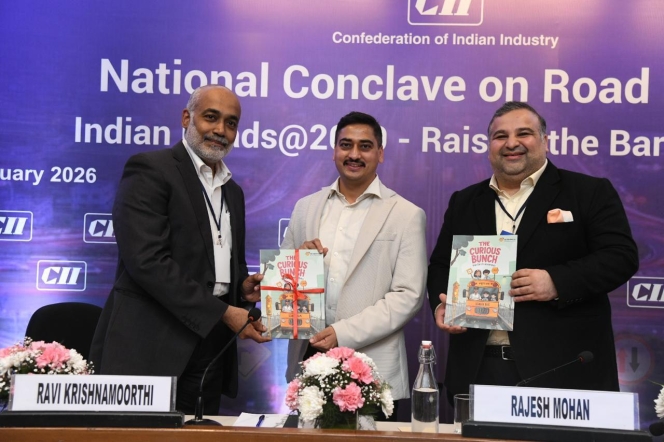
Rosmerta Technologies has launched a comic book titled ‘The Curious Bunch’ at the 3rd Edition of the CII National Conclave on Road Safety. The publication is designed to introduce road safety awareness to children.
The initiative aligns with the Government of India’s ‘4E’ strategy for road safety, which focuses on Engineering, Education, Enforcement and Emergency Care. The comic book aims to address the 168,000 road fatalities reported in India in 2022 by fostering safe habits at a school level.
The comic book uses illustrations to present road scenarios, including pedestrian conduct, school bus safety, traffic signals & the use of helmets, seatbelts and child restraint systems. By educating children, the company intends to influence the behaviour of parents and the wider community.
Rosmerta, a provider of mobility solutions, currently operates technology systems for automated driving tests and AI-based monitoring. The launch of ‘The Curious Bunch’ marks an expansion of its activities into the education pillar of the national safety framework.
Dr Rajesh Mohan, DCP, Gurugram Traffic, said, “When we educate children and instil strong moral and ethical values, the impact travels far beyond the classroom. Children naturally share what they learn. They question, they explain, and they influence conversations at home. In many ways, they become powerful advocates, encouraging their parents to be more aware, more responsible, and more engaged. Over time, this awareness translates into action, because parents are also drivers, commuters, and decision-makers on the road.”
Ravi Krishnamoorthi, Group President, Rosmerta Technologies, said, “Every road accident statistic hides a parent’s anxiety. In 2022 alone, India reported over 168,000 road accident fatalities, according to government data. Road safety is not merely about compliance; it is about compassion and collective responsibility. When a child understands why a red light matters or why a helmet can save a life, they don’t just learn a rule - they become ambassadors of safety within their families and communities. Through ‘The Curious Bunch’, we aim to nurture this awareness early, because the habits we shape in children today will define the safety culture of our nation tomorrow.”
- Maruti Suzuki India
- Transport Department of Tamil Nadu
- Automated Driving Test Tracks
- ADTT
- M K Stalin
- RTO
- CMVR
- Rahul Bharti
Maruti Suzuki Commissions Seven Automated Driving Test Tracks In Tamil Nadu
- By MT Bureau
- February 27, 2026
Maruti Suzuki India, in partnership with the Transport Department of Tamil Nadu, has announced the commissioning of seven Automated Driving Test Tracks (ADTTs) in the state. The facilities were inaugurated by the Chief Minister of Tamil Nadu, M K Stalin.
The tracks are located at Regional Transport Offices (RTOs) in Coimbatore (Central), Tiruvannamalai, Krishnagiri, Madurai (North), Sivagangai, Dindigul, and Tiruchirappalli (West). These sites form part of a Memorandum of Agreement to automate ten tracks across the state, with the remaining three at Tirunelveli, Tuticorin and Marthandam scheduled for operation shortly.
The ADTTs are designed to evaluate applicants for two-wheeler and Light Motor Vehicle (LMV) licences. The system removes human intervention from the evaluation process to ensure objective testing according to the Central Motor Vehicle Rules (CMVR).
Key technical components include:
- Video Analytics: High-definition cameras to monitor vehicle movement and path adherence.
- Sensors: Radio Frequency Identification (RFID) and Harnessing AutoMobiles for Safety (HAMS) technology.
- Identification: Face-recognition systems to verify candidate identity.
- Results: Integrated IT systems that generate test results automatically based on real-time data.
The carmaker has commissioned 56 ADTTs across eight states, including Uttar Pradesh, Delhi, and Bihar. Following the completion of agreements with Rajasthan and Andhra Pradesh, the company’s footprint is expected to reach 81 tracks nationwide.
Rahul Bharti, Senior Executive Officer, Corporate Affairs, Maruti Suzuki India, said, “As part of Maruti Suzuki’s road safety initiatives implemented across multiple states, we are partnering with the Government of Tamil Nadu to strengthen the driver licensing evaluation process through the deployment of 10 Automated Driving Test Tracks (ADTTs). Equipped with high-definition cameras and advanced analytics, these ADTTs enable a comprehensive, efficient, and transparent assessment process. It eliminates any human bias and ensures that only skilled drivers are awarded a license.”
“According to data shared by the Ministry of Road Transport & Highways, India witnessed 1.77 lakh road accident deaths in 2024. Promoting disciplined driving practices and ensuring rigorous driver evaluation are vital to prevent road accidents and augment road safety across the country,” he said.
BYD To sponsor BVRLA Annual Dinner 2026
- By MT Bureau
- February 26, 2026
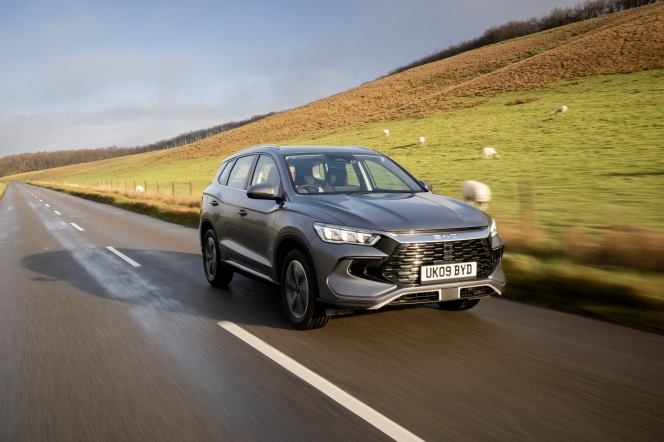
BYD, the world’s leading manufacturer of New Energy Vehicles, will once again serve as the headline sponsor for the British Vehicle Rental and Leasing Association (BVRLA) Annual Dinner in 2026. This marks the third consecutive year the company has supported the prestigious event, which is set to take place on 4 March 2026 at the JW Marriott Grosvenor House Hotel on Park Lane, London. The dinner is widely recognised as the premier gathering for professionals across the rental, fleet management and leasing sectors.
Through its ongoing sponsorship since 2024, BYD reaffirms its commitment to this vital segment of the UK automotive market. The company’s expanding presence was underscored in 2025 by the introduction of several new models, including the SEALION 7, DOLPHIN SURF, SEAL 6 Saloon and Touring and the ATTO 2. These launches contributed to significant sales figures, with 21,824 units delivered to fleet customers and 5,964 to the rental sector. The momentum has continued into 2026 with the debut of the SEALION 5 DM-i, while the ATTO 2 DM-i and ATTO 3 EVO are expected to arrive shortly. Supporting this growth is a dedicated UK fleet team of 11 specialists, offering tailored product and service expertise.
The BVRLA represents around 1,000 member organisations, ranging from SMEs to large public companies, all operating within or alongside the UK’s vehicle rental and leasing industries. By engaging with government and upholding professional standards, the association enables its members to provide safe, sustainable and accessible transport solutions. This year’s Annual Dinner will feature the presentation of the Industry Hero Awards and live entertainment from award-winning comedian Tom Ward, celebrating excellence across the sector.






Comments (0)
ADD COMMENT